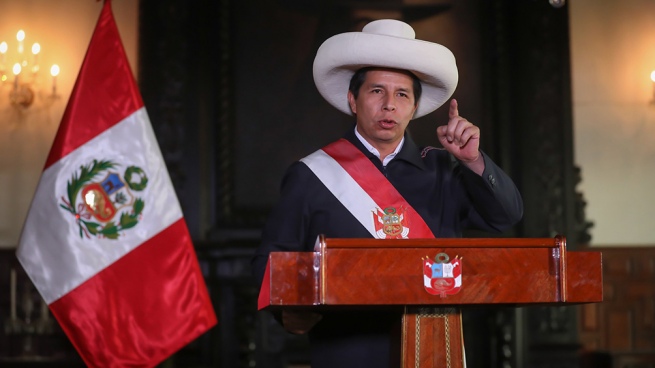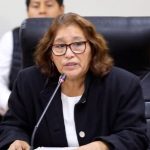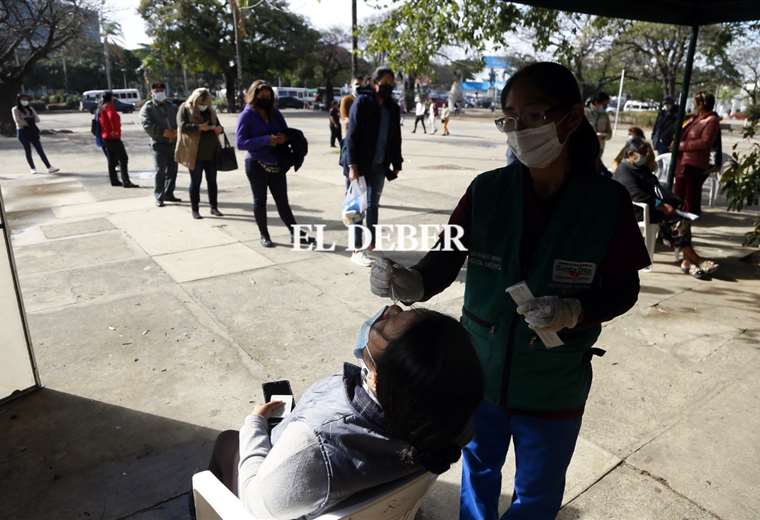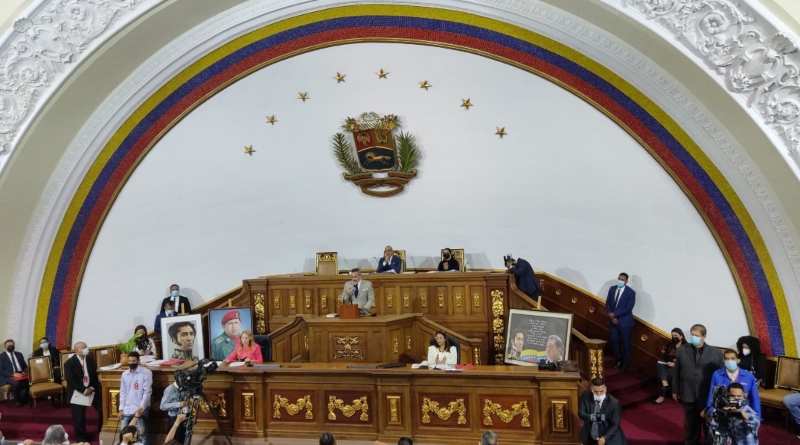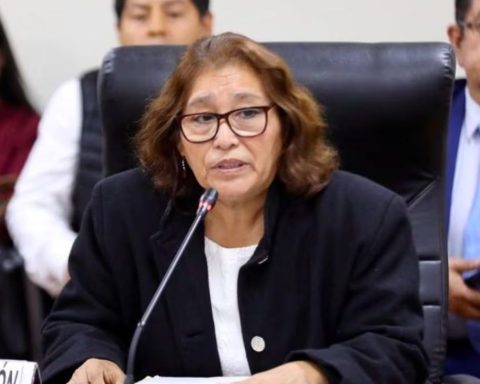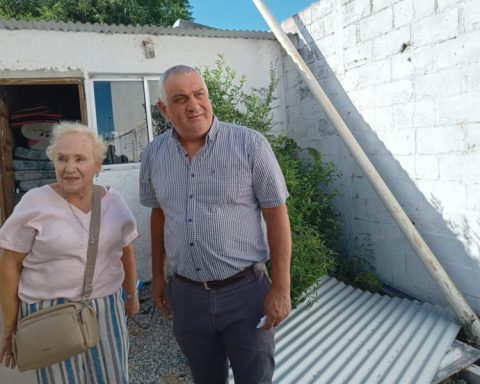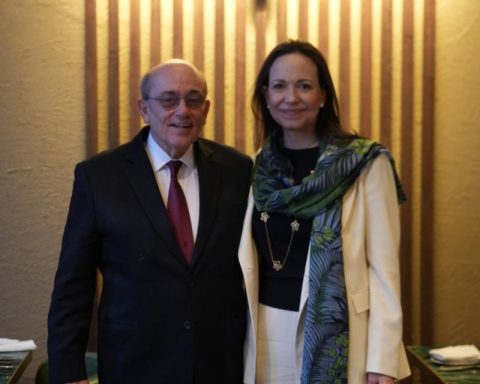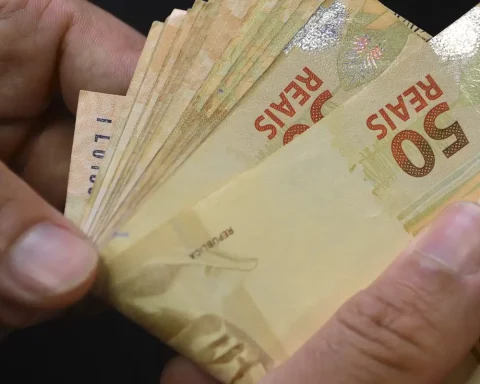The president of Peru, Pedro Castillo, celebrates one year in power this Thursday amid an incessant offensive by opponents, complaints and tax investigations for alleged corruption and doubts about what his future will be in the short and medium term. .
The eyes and ears of Peruvians are focused on what Castillo will say on Thursday in his annual address to Congressbut also in what the former Secretary General of the Presidency Bruno Pacheco can say against him, alleged orchestrator of the corruption network and who turned himself in in the last hours after several months in hiding.
According to observers and political actors, the future of the president could depend in part on Pacheco’s statements, who since he took power, and even before, has been the target of an intense campaign by his opponentsespecially from the three “hard” right-wing parties: Fuerza Popular (FP), Avanza País and Renovación Popular (RP).
With a popularity that according to polls barely borders 20%Castillo, who came to the presidency at the hands of the Marxist-Leninist Free Peru (PL) party -which he resigned-, has had involuntary allies among his staunch rivals, since, analysts agree, being even more rejected by public opinion They lose effectiveness in their offense.
The result of the year points to what the political scientist Paolo Sosa calls a “catastrophic tie” between the Executive and the Legislative, which has led the country to an impasse that makes it difficult to adopt and execute public policies to face the delicate economic and social situation. .
“Congress does not want to leave and neither does the president and the ones who are going to lose are us (the population),” political scientist Serly Figueroa, who is based in Cusco, said on the Ojo Público portal, a city that, like several others in the Andes, massively supported Castillo in the elections.
After a year in which Castillo contributed to his wear and tear with “unforced errors” in the appointment of officials and the lack of transparency, according to what is agreed even in the ruling party, few are willing to bet that the mandate will last until 2026.

Castillo, a 52-year-old rural school teacher with no prior political experiencehad already had to face two impeachment attempts in Congress, which failed because FP, RP, Avanza País and eventual individual allies did not reach the necessary 87 votes (out of 130).
The problems for the president began from the moment in which, against all odds, won the first electoral round and advanced to face Keiko Fujimori in the secondof FP, who had practically all the political and media apparatus in Lima in favor.
The campaign against a castle that was called “communist” and He disqualified himself with comments often full of racism and classism, it did not worksince he won the ballot by a meager difference, in the midst of accusations of a fraud of which the slightest proof never emerged.
As soon as the new president took office, FP, RP and Avanza País explicitly orchestrated attempts to remove him and to take his vice president, Dina Boluarte, eventual successor in case of impeachment.
Also there were decisions by Castillo that played against him. The first, in the opinion of analysts, was place Guido Bellido as head of the ministerial cabineta confrontational PL leader who barely two months later had to give way to a more moderate left-wing politician, Mirtha Vásquez, in a failed attempt to calm things down.
Even from socialist sectors they reproach Castillo for his mistakes in appointing officials. The use in a year of more than 50 ministers gives a sign of it. Scandals due to alleged corruption and/or ineptitude of portfolio holders have been a constant.
The Executive, in this framework, had problems imposing an agenda in a complex scenario derived from the pandemic, the cost of living, insecurity, unemployment and the threat of a food crisis. The Legislature, bent on obstruction, did not contribute in this way either.
Complaints of alleged corruption were a constant presence. Although almost all the recent presidents of Peru have been in similar cases, Castillo is the first to have tax investigations opened when he is still in office. And not one, but there are already five.

The Prosecutor’s Office points to the president for “criminal organization” and “aggravated collusion” for allegedly maneuvering to give a company works in exchange for bribes. Although the participation of the head of state has not been fully documented, characters close to him are on the ropes, to the point that they have opted for hiding.
The fiscal barrage against Castillo also includes investigations for supposedly helping a company to sell biodiesel to the State, obstructing justice by covering up fugitives, unduly pressing for military promotions and plagiarizing the thesis he co-wrote with his wife, Lilia Paredes, for a master’s degree in Education.
In all these cases, the president replies that he is the victim of an offensive by elites who do not support the government of a teacher whose life until reaching the Palace was spent in the countryside. His lawyer, Benji Espinoza, insists that there is no evidence that points directly against the head of state.
Opponents hope that Pacheco will provide that evidence, but two other visible accusers and aspiring collaborators of Justice, lobbyists Karelim López and Zamir Villaverde, have so far not been able to document direct presidential participation.
The right-wing opposition, whose longing confessed by some referents is to take over the presidency and remain in office in Congress until 2026is now balancing between promoting a third vacancy motion (removal) or going, based on the progress of the Prosecutor’s Office, for a suspension that in practice would leave the head of state in other hands.
In this context, a citizen initiative seems to be gaining strength to force through signatures early elections for both the president and Congress, which has been summed up in the phrase “let them all go.”
Castillo says that there is still time to rebuild and extended an olive branch to the new president of Congress, Lady Camones, who replied, however, that in her opinion it is very difficult for corruption to occur without presidential participationwhich seems to indicate that there will be no truce.

The supporting actors in the first year of Government
Vladimir Cerron: The founder and leader of what was Castillo’s party, Peru Libre (PL), has tried to control the president to impose a radical agenda and has generated disputes in the ruling party, today divided into four factions, to the point that the president himself distanced himself from the collective.
Cerrón, a 51-year-old neurosurgeon trained in Cuba, cannot participate in the elections because he was convicted of corruption as governor of the Junín department, but his opponents, who include groups from the left, accuse him of having enormous power even now.
Maria del Carmen Alva: The now former president of Congress, a 55-year-old lawyer, never hid her animosity against Castillo, who is playing the wall with the toughest right despite being a member of the Popular Action party, which is more to the center. Alva, a member of a traditional family of politicians and who came to Congress for the first time after other attempts, was involved in numerous disputes and was accused of racism and classism for her phrases and gestures. Her critics attribute a good part of the popular resistance against the Legislature to her.
George Montoya: Although many believe that the baton of the opposition is in the hands of former presidential candidates Keiko Fujimori and Rafael López Aliaga, it is Montoya, a 71-year-old admiral, who has borne the voice of Castillo’s most radical opponents in Congress.
The ultra-conservative parliamentarian, new to electoral politics and with harsh phrases and manners, has had the initiative in impeachment attempts, although many of his colleagues believe that his style, ironically, ended up helping the president.
Dinah Boluarte: Despite her usual low profile, the Vice President of Peru and Minister of Social Inclusion, a 60-year-old lawyer expelled from PL for criticizing Cerrón, draws attention because she is the one who should constitutionally replace Castillo if he were dismissed.
Boluarte has been ambiguous when commenting on what she will do if that scenario occurs, but the most radical opposition has made it clear that the intention is also to remove her -since as a minister she continued as president of a private club, which is prohibited- , so that it is the head of Congress who assumes the eventual interim head of state.
Bruno Pacheco: A 52-year-old professor, with no previous experience in the circles of power, he came to the General Secretariat of the Presidency out of friendship with Castillo and from that position, which generally takes place in anonymity, he gained prominence when he was singled out as an alleged orchestrator of corruption networks. .
After months in hiding, Pacheco turned himself in this week and his statements are awaited with anticipation given the possibility that they involve the president, who could be exposed to at least being suspended from office.
Hannibal Torres: The head of the ministerial cabinet, a 79-year-old lawyer, maintains a permanent hostile relationship with opponents, with whom he usually exchanges words that may include insults.
Torres, former Minister of Justice, was put at the head of the cabinet to build bridges with other sectors, but everything has led to disputes, unlike the conciliatory style of his predecessor, the left-wing lawyer Mirtha Vásquez, who despite this was also harshly attacked. .
Cesar Acuna: From outside Congress, the former presidential candidate, a 69-year-old chemical engineer, has been instrumental in getting his center-right Alianza Para el Progreso (APP) party to vote against the attempts to remove Castillo from office and act as a balance sheet.
APP’s prominence is such that, among four candidates this week to preside over Congress, three left that party, although two – including Acuña’s brother, Víctor – resigned from the ranks to run for other alliances. The new president of Congress, Lady Camones, belongs to the party.
Ezra Medina: A 55-year-old administrator linked to fundamentalist evangelical sectors, he has been the architect of anti-progressive maneuvers in Congress, which include a harsh offensive against the gender approach in education, abortion or the rights of women and sexual minorities.
Medina, who is also the spearhead of a counter-reform in university education, has found allies for his social conservatism in PL and caused a great surprise by appearing as that party’s candidate for the presidency of Congress, which cost him out of Renovación Popular.
